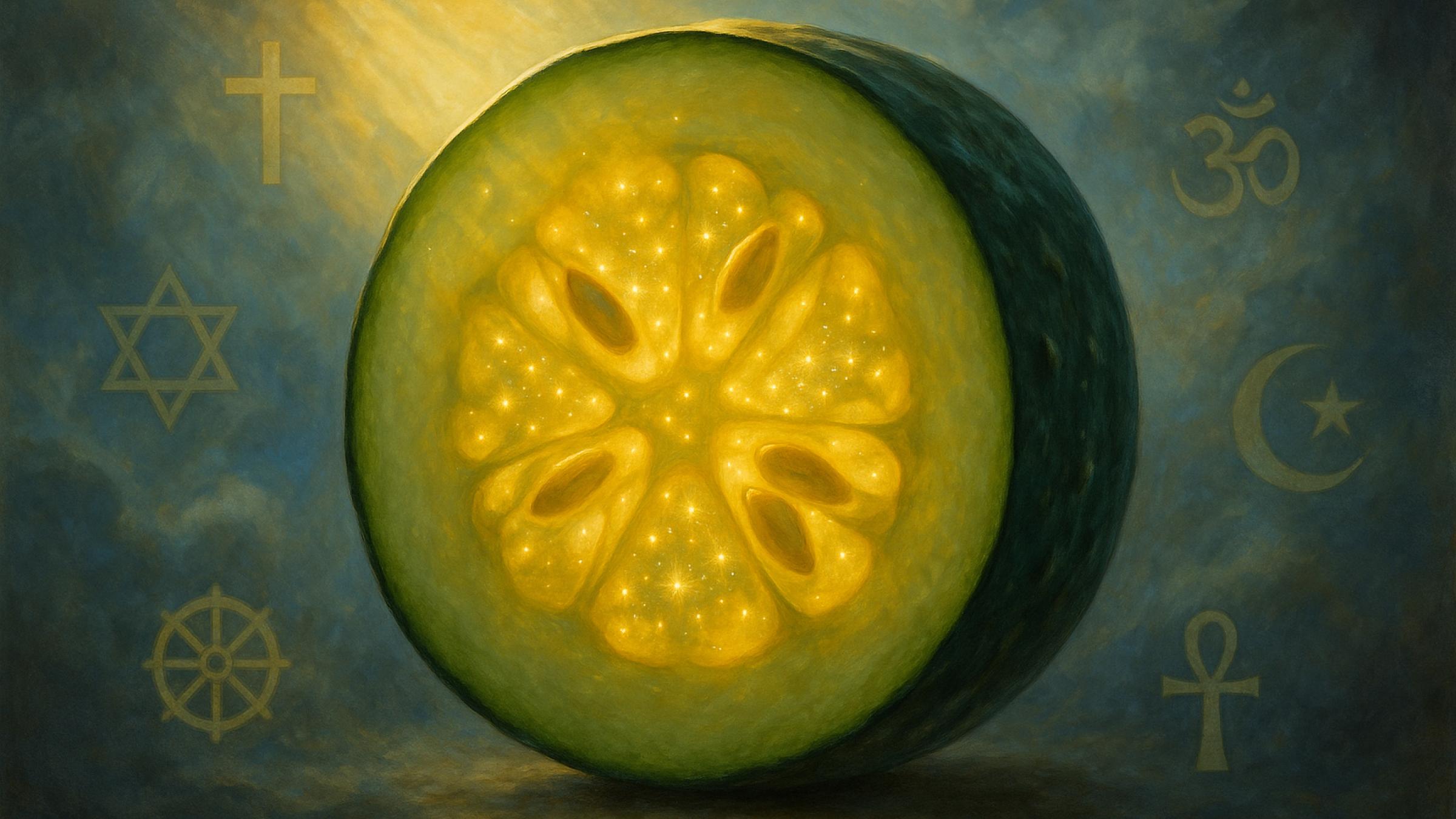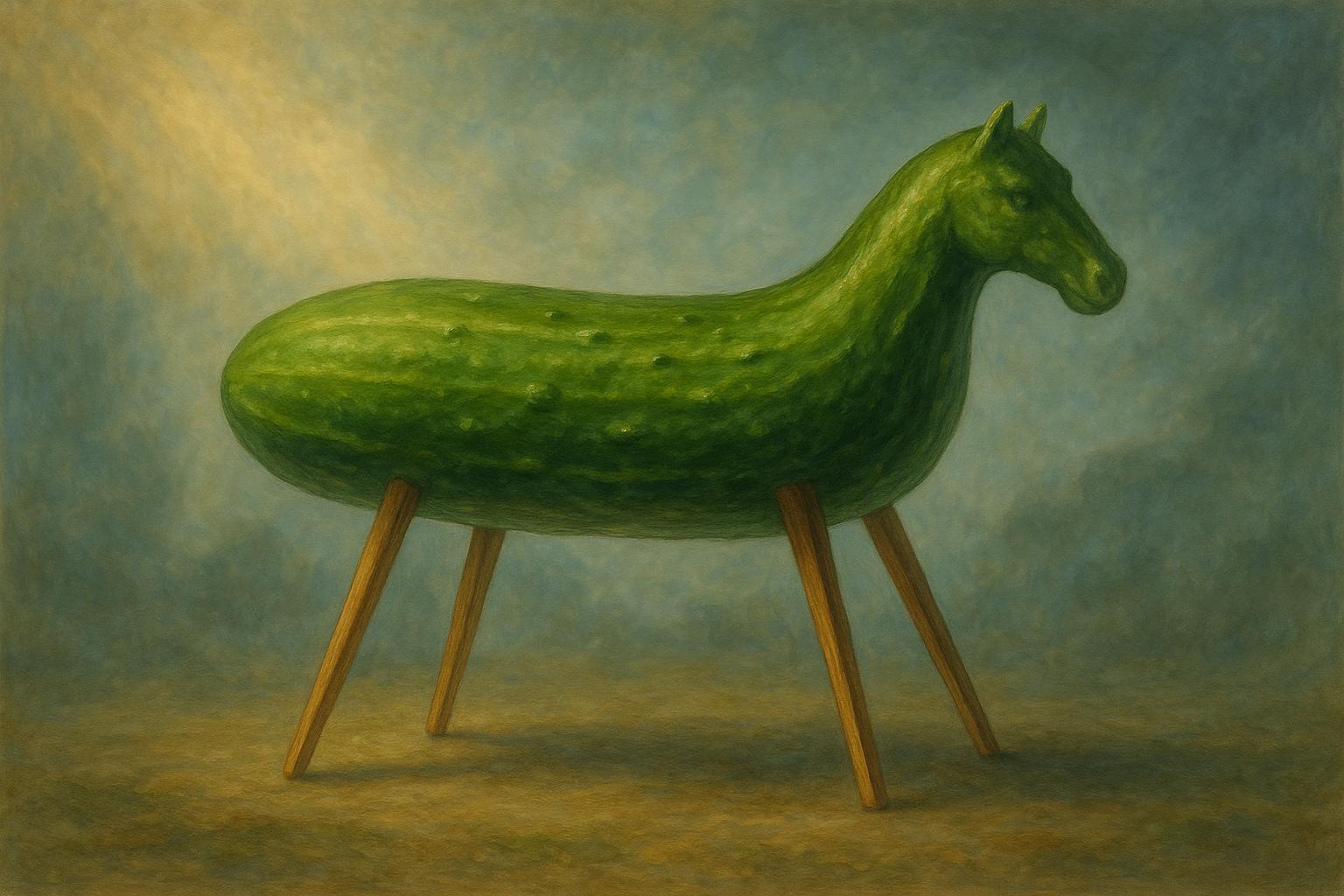
Throughout human history, certain foods have been elevated beyond mere sustenance to hold even profound spiritual significance. While bread, honey, wine, and milk often command the conversations, the humble cucumber emerges as a surprisingly meaningful food across diverse historical traditions.
This unassuming vegetable appears in sacred texts, rituals, and philosophical teachings worldwide and over thousands of years, carrying rich symbolic weight that transcends its simpler modern associations.
In fact, one of the most influential Christians of all time came from a religion that viewed cucumbers as the most spiritual food and considered that distinction quite a big deal. (read on…)
Biblical References: Desire and Discontent
In the Old Testament, cucumbers make a notable appearance during Israel's wilderness journey. Numbers 11:5 records the Israelites lamenting, "We remember the fish we ate in Egypt at no cost—also the cucumbers, melons, leeks, onions and garlic." [1] This reference positions cucumbers as part of a nostalgic longing for Egyptian abundance during their desert wanderings.
This passage reveals a lesson about human nature. The Israelites had been miraculously delivered from slavery and were receiving divine provision of manna, yet they fixated on what they lacked, including the heralded vegetable.
Isaiah 1:8 offers another significant biblical reference: "And the daughter of Zion is left as a booth in a vineyard, as a lodge in a garden of cucumbers, as a besieged city." [1] This metaphor compared Jerusalem to an abandoned watchman's shelter in a cucumber field (they would guard the harvest). Once the crops were gathered, these small huts stood isolated and vulnerable, just as Jerusalem remained exposed and spiritually desolate after rejecting their God and receiving his judgment. The image would have resonated immediately with Isaiah's audience, who knew these temporary structures as symbols of impermanence and abandonment.
90s Christian Culture: Larry the Cucumber
Larry the Cucumber stands as the undisputed star of VeggieTales, the Christian animated phenomenon that captivated millions of children throughout the 1990s and beyond. While co-star Bob the Tomato served as the straight man, Larry's goofy charm, unexpected wisdom—and superhero alter-ego "Larryboy"—made him the beloved cultural icon he remains today.
Fun fact: Creator Phil Vischer initially considered a candy bar character until his wife suggested a healthier alternative. The cucumber won out for both the parental support and for practical reasons: its simple shape was easier to animate with 90s graphics technology, continuing the cucumber's long history of spiritual and cultural significance (though perhaps not intentionally). [3]
Islamic Tradition: Balance and Prophetic Wisdom
In Islamic tradition, cucumbers gain spiritual significance through their association with the venerated prophet Muhammad's diet. According to a well-documented hadith (the recorded sayings and actions of Muhammad), Abdullah ibn Ja'far reported: "I saw the Messenger of Allah, peace and blessings be upon him, eating fresh dates with cucumbers, holding cucumber in one blessed hand, and dates in the other while always eating with his blessed right hand." [2][10] This simple dietary habit established a Sunnah (traditional practice) that Muslims have followed for centuries, though as a “sunnah of habit” (i.e. valued, but not mandatory).
The 1400 year-old practice represents an embodiment of prophetic wisdom. Islamic scholars frequently note that the cucumber is medicinally described as having a "cooling, neutralizing effect" beneficial for various ailments including "heartburn, heatstroke, thirst, dehydration." [2] The dates, conversely, provide a sort of “warming energy.” This pairing is said to create a perfect equilibrium and demonstrate an Islamic principle of balance and moderation. [11]
Manichaean Reverence: Vessels of Divine Light!
Perhaps the most extraordinary spiritual elevation of cucumbers comes from Manichaeism, a once-widespread religion founded by the prophet Mani in the 3rd century. Manichaean cosmology taught a radical dualism (spiritual light = good, physical matter = evil) with particles of divine Light trapped within physical creation, especially in plants. [4][12]
For Manichaeans, melons and cucumbers held special status. Their high water content, light color, and growth under sunlight made them appear to contain many light particles ready to be released. The Manichaean elect would consume these foods ritually, believing they were literally liberating divine Light with each bite. [5]
Imagine an ad with a line like that!
Augustine, who followed Manichaeism before becoming one of the foremost historical giants of the Christian tradition, described how he’d been taught that even a humble fig "weeps when picked, shedding milky tears, because a bit of the divine essence is trapped in that fruit." [5] This illustrates how seriously Manichaeans regarded the spiritual importance of plant foods, with cucumbers and melons being particularly revered.
Hindu Tradition: Liberation and Transcendence
In Hindu spiritual tradition, the cucumber appears in one of the most powerful Vedic prayers—the Maha Mrityunjaya Mantra from the Rigveda (7.59.12). This prayer to Lord Shiva includes the line "urvārukam iva bandhanān mṛtyor mukṣīya," which translates to "Like a cucumber (urvāruka) from its vine, may I be freed from death." [6]
This metaphor uses the cucumber's natural separation from its vine at ripeness to symbolize the soul's liberation from the bondage of mortality. Just as a cucumber effortlessly detaches when mature, the devotee seeks divine favor to slip from death's grasp into immortality. This vivid comparison conveys an idea of ease and natural freedom when the time is right.
In Ayurvedic tradition, cucumbers are considered a sattvic food—pure, harmonizing, and promoting spiritual clarity. Their cooling properties make them valuable for balancing the fiery pitta dosha (one of three fundamental bodily energies), thus supporting meditation and inner calm. [7]
Japanese Folk Spirituality: Bridges Between Worlds
In Japanese folk tradition, cucumbers serve a unique spiritual purpose during Obon, the festival honoring ancestral spirits. Families create shōryōuma—"spirit horses"—by inserting four chopstick legs into a cucumber. These cucumber horses are believed to provide swift transport for ancestral spirits returning to visit the living. This practice demonstrates cucumbers as bridges between physical and spiritual realms. [8]
🐎🥒 - bet you never expected to see these two emoji together. Or this: 🫣

Rising Cucumber Spirituality From Wellness Influencers
In recent years, a new form of cucumber spirituality has emerged within modern wellness communities. These approaches blend scientific terminology with spiritual concepts (terms like “Universal Love/God/Source”, “spiritual energy”) in a sort of post-religious spirituality, as they borrow concepts from various traditions while avoiding any explicit religious ties. [9]
Wellness influencers and holistic health practitioners can position cucumbers as having special energetic properties. For instance, Cate Ritter describes cucumbers as "cleans[ing] negative energies" and "align[ing] chakras" when consumed mindfully in her “high vibration foods” framework. [9] This language echoes the ancient religions discussed, though repackaging it.
Other platforms like MindBodyGreen and Goop have published articles positioning cucumbers as "detoxifying not just for the body but for the spirit," claiming they can "clear stagnant energy" and "promote spiritual awakening" through their high water content and "living enzymes." [13]
Why Cucumbers? Universal Qualities
A few qualities inform the cucumber's symbolic power and historical spiritual connections:
- Purification and Cleansing: The cucumber's high water content (96%) naturally associates it with purification. In various traditions, ranging from Hindu ritual to even some modern wellness practices, cucumbers represent cleansing of both body and spirit.
- Cooling Presence: In the hot desert climates where many religions find their origin, the cucumber's refreshing nature made it especially valued. This cooling property translates symbolically to calming spiritual heat—like passion, anger, or spiritual distress.
- Transparency and Clarity: When cut open, a cucumber reveals clear, clean flesh—seeming physically analogous to clarity or truth and contrasting with more complex or hidden foods.
- Growth Pattern: Cucumbers grow from small flowers into large fruit while climbing upward, mirroring spiritual growth and ascension.
Conclusion
In our complex, often overheated world, the cucumber's qualities of coolness, clarity, and purification offer broader public interest.
Many schools of thought have recently rediscovered what most ancient traditions have long advocated for—that what we consume affects not just our physical health but our holistic well-being.
For those who follow Jesus in particular, the cucumber might remind us of God’s wisdom and the way He reveals himself to us even in the most ordinary aspects of creation. There are more Biblical lessons that could be told about Christian contrasts on the physical vs the spiritual (for example, we believe Jesus bodily rose from the dead and in mysterious physical elements of the Eternal State going beyond mere spiritual abstractions) — but we’ll leave that for another day.
Works Cited
[1] Holy Bible, Numbers 11:5 (NIV translation) and Isaiah 1:8 (ASV translation).
[2] "The Cucumber Sunnah," The Eco Muslim, accessed April 30, 2023, https://www.theecomuslim.co.uk/2023/07/cucumber-sunnah.html. More: the practice of eating cucumbers with dates has a rich history in Islamic tradition. The hadith documenting this practice appears in multiple authoritative collections including Sahih Muslim, Bukhari, Abu Dawood, and Sunan Ibn Majah. This is considered a "sunnah of habit" (personal preference) rather than a formal religious obligation. This distinction is important in Islamic jurisprudence - it means Muslims view this practice as beneficial to follow but not mandatory.
[3] Phil Vischer, Me, Myself, & Bob: A True Story About Dreams, God, and Talking Vegetables (Thomas Nelson, 2007).
[4] "Manichaeism," Catholic Encyclopedia (1913), detailing Manichaean diet and preferred fruits with trapped light.
[5] Augustine, Confessions, Book III, describing his beliefs as a Manichee regarding divine substance in fruits.
[6] Maha Mrityunjaya Mantra (Rigveda 7.59.12), translated by Jamison & Brereton (2014).
[7] "Cucumber in Ayurveda," Journal of Ayurvedic and Herbal Medicine 3, no. 4 (2017): 239-241.
[8] "The Cucumber Horses and Eggplant Cows that Welcome Back the Dead," Atlas Obscura, E. Freeman, 2018.
[9] "High Vibration Foods to Elevate Your Diet," Cate Ritter Wellness, accessed May 2023.
[10] Sahih Muslim, Hadith collection, Book of Drinks, narrated by Abdullah ibn Ja'far: "I saw Allah's Messenger (ﷺ) eating cucumber with fresh dates." This is one of the six major authentic hadith collections in Sunni Islam.
[11] Ibn al-Qayyim, "Tibb al-Nabawi" (Prophetic Medicine), 13th century treatise on Islamic medical practices, discussing the balance of cucumber's "cooling" properties with the "warming" nature of dates.
[13] "Spiritual Foods for Energetic Cleansing," MindBodyGreen, 2022, featuring multiple wellness practitioners discussing the "energetic properties" of various foods including cucumbers.






